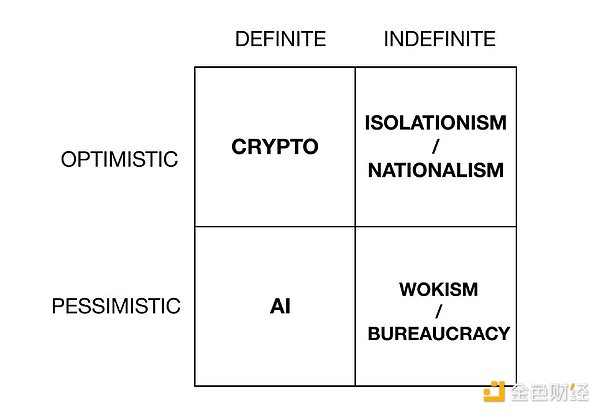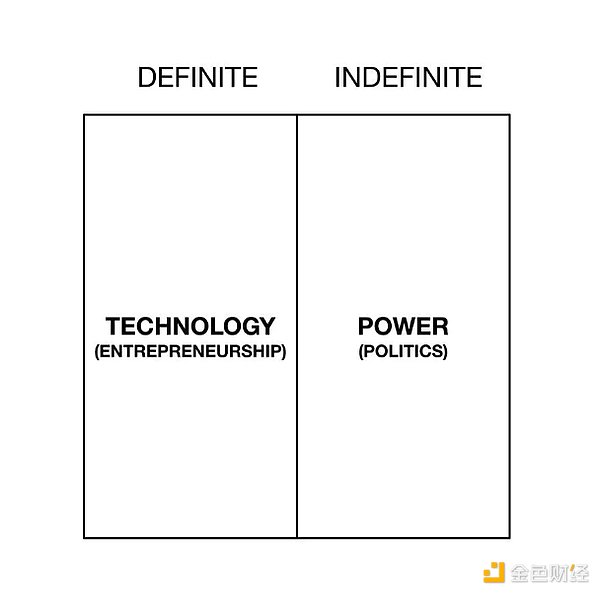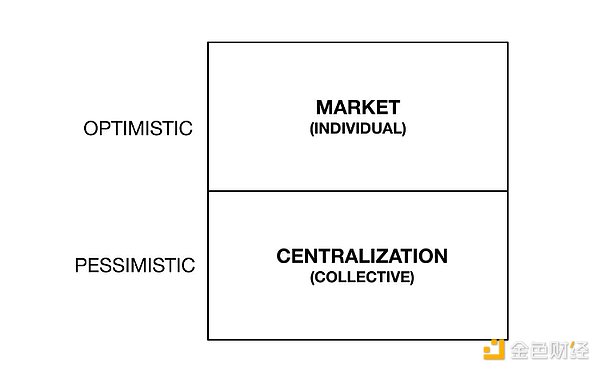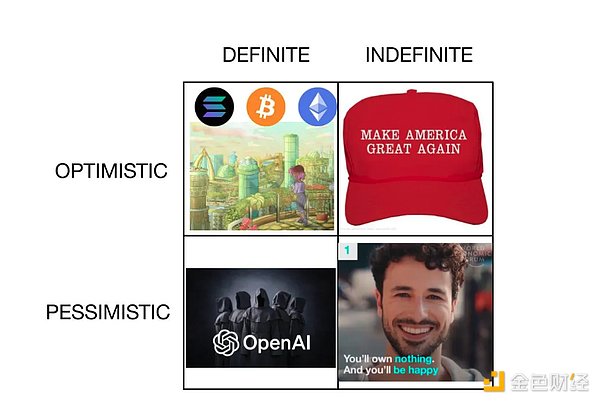Author: Matti, Zee Prime Capital Source: X, @mattigags Translation: Shan Ouba, Golden Finance
Cryptocurrency is seen as many things: a luxury for geeks, monetary anarchism, a delusional scam, and a number of other labels. Today's cryptocurrency industry has moved away from the libertarian dream originally pursued by Satoshi Nakamoto and a handful of cypherpunk computer scientists. Cryptocurrency has undergone startupization and has become ideologically diverse.
The reality is that the biggest enemy is not those who do not believe in cryptocurrency, but those who dare to tamper with the "scripture". Bitcoin supporters hate Ethereum supporters, and Ethereum supporters don't like Solana supporters. I exaggerate for a reason. It’s usually the most radical minorities that are the most vociferous. Yet the conflict is palpable—it’s not a conflict of coins versus no-coins, but a struggle between coins and coins.
Talk of conflict may seem less optimistic, but that just goes to show that this subculture replicates religious conflicts of the past (and present). If crypto is a religion, it’s a religion centered around a revolution in money, finance, and commerce. Deities are fungible, narratives are flexible, and financial expectations are scalable. Crypto replaces “in God we believe” with “in our coins we believe.”
Optimism
The optimism I’m talking about is about a person understanding his or her ability to change the world as a superpower and using it to harness the energy of the wild nature into which he or she is born.
Optimists tend to experiment and take risks. The Optimist loves freedom and despises tyranny. But when the Optimist despises something, he is risking it. He bets the opposite because he knows, as Serling writes: "When people can hate without risk, their stupidity is easily convinced and motivation is natural." The Optimist has no pressing need to rule for others, he understands that he will often make mistakes, but still tries. The Optimist seizes opportunities to explore, create, and rebuild the world to his image. The Optimist understands that expanding knowledge is the bond of life, enabling his descendants to abolish old ideas and follow new ones. The Optimist understands that resources are not limitations but opportunities, because creativity gives resources power to transform the surrounding environment into energy that serves him. The Optimist accepts change and sees it as a necessary condition for moving forward. How does this optimism relate to the manifesto of cryptocurrency? In the beginning, it all started with one man who was able to envision a world where governments didn’t control monetary affairs, and that optimistic origin is at the heart of cryptocurrency. It’s not that political institutions are evil, it’s that they’re easily corrupted. And it’s not that people are evil. Institutions are prone to power grabs as they govern longer. After a while, they start looking inward and serving mostly themselves. Why? Because as they age, they become less relevant, their dogma is static, and the world moves on. But they want to survive. They cling to relevance. Suddenly, the world serves them, and they no longer serve the world. To survive, they need to exert more power at the expense of the communities they govern. The original cryptocurrency idea, Bitcoin, was designed to reduce the exercise of power, relying not on a monopoly of violence but on immutable code in the cloud. It was a foolish dream. And yet, it worked. This optimistic experiment is now worth trillions of dollars. Today, it’s not just Bitcoin. There’s so much more.
Cryptocurrency
Cryptocurrencies rise and fall in a very obvious way. The higher they go, the harder they go down. Certain laws of nature apply to financial markets and the human spirit as well. Cryptocurrency never stops, there’s always something going on.
Proponents and critics can’t agree on whether memecoins are good or bad, and some succumb to price action. They also can’t reconcile whether VC-backed coins that emerged on the market at crazy valuations fell before or after releasing a minimum viable product.
Investors jump from narrative to narrative, investing in things that either don’t work, don’t work at all, or if they do, nobody uses them. Most things go to zero.
The medium is the message. Memecoins are a medium, cryptocurrencies are a medium, and human behavior is just unfolding in new ways driven by new technologies. It’s part of the game that things go to zero. It’s okay that things go to zero, because cryptocurrencies are still the most optimistic technological movement in the world. Every technological and cultural revolution leads to exploitation because it’s revolutionary. This opens up information asymmetry, and people quickly (mis)exploit that information to gain profit. But ultimately, in cryptocurrencies, people have taken matters into their own hands, tried to solve governance problems (and failed), tried to build a new internet, trusted neutral payment rails, built new physical infrastructure for all sorts of weird use cases, funded research projects that couldn’t be funded elsewhere, busied themselves with cultural monetization, made generational wealth before releasing a product that was adopted by more than 1,000 users, built casinos, became alternative financial products, tried to build new cities, and defied death. Most of this may be misguided. But it shows the great spirit that cryptocurrencies have to offer.
Crypto is the Wild West meets Las Vegas, a frontier where you can get rich overnight, but are more likely to lose your net worth and get scammed by sex workers. It is a place where dreams come true, lands are to be taken, wealth is gambled away, and conflict is a daily norm.
Pessimists vs. Optimists
For years, I have kept Peter Thiel's simplified Optimism vs. Pessimism 2x2 framework in my head.When you have a hammer, anything is possible. He writes: “If you view the future as certain, then it makes sense to understand it in advance and to work to shape it…If you expect an uncertain future dominated by randomness, you will give up trying to master it.” The infinite pessimist “simply reacts to events as they occur and hopes that things won’t get worse…He has no way of knowing whether the inevitable decline will be rapid or slow, catastrophic or gradual. All he can do is wait for it to happen.” The definite pessimist “is obsessed with the ways things will get worse…He thinks the future is knowable, but since it will be bleak, he must prepare for it.” The uncertain optimist sees a better future, but he doesn’t know how to get there. Finally, the definite optimist, sees a better future and so plans and works to get there. Here’s my simplified version of the narrative that dominates my Twitter feed:

I frame politics and technology as a vertical divide between certainty and uncertainty. That’s because politics is not about wealth creation, it’s about governance and distribution. At its best, good politics is an enabler of technology and entrepreneurship. But it doesn’t create the future by itself. Technology does. It’s the matrix on which society unfolds, the network of information exchange between humans.

The horizontal dividing line is about the role of the individual versus the collective. Optimists emphasize the individual above, and the individual becomes the foundation. It is more about change from the bottom up and robustness achieved through decentralization. Pessimists, on the other hand, see the world as fragile and want to rely on top-down control. They believe that only through power can things be fixed to prevent things from getting worse.

Let’s start with the explicit pessimism of the AI narrative. It is explicit because it relies on a technological paradigm. Why is it pessimistic? The core of this narrative is that machines are greater than humans themselves. It is a novel interpretation of God, who speaks to mortals through chatbots. Centralized algorithms rule over all. And we are at the mercy of this technology. Either we are killed by this superior being, or we can study the alignment scriptures. AI is the “Abrahamic interpretation”, not artificial intelligence. Humans become a mere subject. There is nothing we can do, we cannot stop it, we can only give in and hope that we will not be wiped out by this ferocious force.
Other pessimists, those who are uncertain, are awakened. They believe that everything has been invented and now we can only redistribute it. The core of this interpretation is power. Use power to distribute it from the strong to the weak. There is no other way, capitalism has failed, we can only freeze humanity and rule with the cold hand of bureaucracy, forcing us into the misery of paper straws.
Humanity is the culprit. Nature is the victim. The poor are the victims. The victors are the perpetrators. The only way is that we all fail equally. There is nothing to promote only superficial diversity and homogeneity of thought, and those who do not play by the rules do so because they are here to save us from original sin. The world is fucked, stop using energy for progress because the only progress is the equality of suffering.
Now let’s talk about the uncertain optimists: “Hey, things didn’t work out this way, so we should go back and fix the problems.” But how to do that? Going back is not the way out. The way forward is unknown. Embrace nationalism? Sure, it’s useful for cultural cohesion, but the scale-transforming nature of the patriotic individual can turn into a destruction machine.
Uncertain optimism rejects globalization’s homogeneity and ridiculous bureaucracy, but is confused by the shifting new technological realities. It feels threatened and can be prone to close-mindedness. It doesn’t know how to embrace technology as the foundation of how society functions.
Ban social media? Is that the same as banning the printing press? The Reformation has already begun, and suppressing it will ultimately backfire. How to take control and work toward a particular future direction?

The Absolute Optimism of Cryptocurrency
If you’ve been around cryptocurrencies for a while, you know it’s a mess, an absolute mess. But the chaos, the noise, and the misleading energy of a technological revolution are all the result of a strong desire to be in control.
It starts with finance, because markets are resource control machines. If we change the structure, we can shift the flow of value to something that the baby boomers didn’t dare to do. They liked things the way they were. Cryptocurrency is not like that. It wants change, but it doesn’t rely on mere protest. It builds. It takes risks. It doesn’t want to Occupy Wall Street. It wants to liberate it.
Crypto is solarpunk. Crypto is about financial freedom, decentralized cities, and funding scientific experiments. Crypto is the naughty child of mischief. Despite its naive appearance, decentralized, trusted, neutral money that is immune to corruption and political bias is a major technological revolution. It frees money. It ignores alarmist politics. Has the world become safer under the tyranny of KYC and AML, or vice versa?
Crypto has created a new asset class that enables the transfer of wealth from the incumbent generation. Housing is unaffordable, so crypto has created new games to circumvent the bureaucracy that prevents young people from owning anything and getting ahead in life. It rejects “having nothing and being happy.” It wants to have everything and be miserable. But be miserable on your own terms.
Yes, we launched worthless NFTs. Yes, we dump overvalued tokens on clueless retailers. Yes, we use techno-jargon to save our lives. Yes, we fund useless stuff. At the end of the day, this is a revolution. No one ever promised you it would be a good thing. We took over the digital world, created new rules, and started a new game. It’s not perfect, but we’re on a mission. Embracing the individual and finding novel ways to do finance and commerce. These may be wacky experiments, but our vision is to understand that money is the force for change. We move slowly, one step at a time. Bitcoin. Ethereum. ICOs. Uniswap. Solana. What’s next? Bio.xyz? HairDAO? Most will fail at the cutting edge. But only a handful will survive and have a global impact. We’re embracing the asymmetry of outcomes. Yes, we launched worthless NFTs. Yes, we dump overvalued tokens on ignorant retail investors. Yes, we save lives with techno-jargon. Yes, we fund completely useless things. Ultimately, this is the revolution. No one promised it would be good.
We conquered the digital world, created new rules and started new games. It’s not perfect, but we’re on a mission. Embracing the individual, finding new ways to do finance and commerce. These may be wacky experiments, but there’s an understanding that money is the power of change.
We move slowly, one success after another. Bitcoin. Ethereum, ICOs, Uniswap, Solana, what’s next? Bio.xyz? HairDAO? Most will fail at the cutting edge. But only a few that survive will have global impact. We accept the asymmetry of outcomes.
Yes, cryptocurrency is the real cutting edge. You don’t need a long list of credentials to make a difference in this world. A few lines of code can go a long way. Bad ideas get launched to the moon (and back). But so do good ideas. And we need more of them.
So if you haven't gotten into crypto yet, you should join the clowns, the charlatans, and the pilgrims. There's a lot of money to be made, and a fortune to be lost. We're funding truly tragic causes.
We always need new people to help us get through the storm. We can't rely on divine intervention to move forward because we become uncertain optimists. We need new ideas and bold execution to keep the most certain optimistic movement on the planet going.
It won't be baby boomers who buy Bitcoin and Ethereum ETFs. It'll be regular people who dare to explore the frontiers, find inspiration, and innovate against all odds. That's the spirit that drives crypto forward.
 JinseFinance
JinseFinance
 JinseFinance
JinseFinance JinseFinance
JinseFinance JinseFinance
JinseFinance JinseFinance
JinseFinance Weiliang
Weiliang JinseFinance
JinseFinance Huang Bo
Huang Bo Brian
Brian Nulltx
Nulltx Coindesk
Coindesk